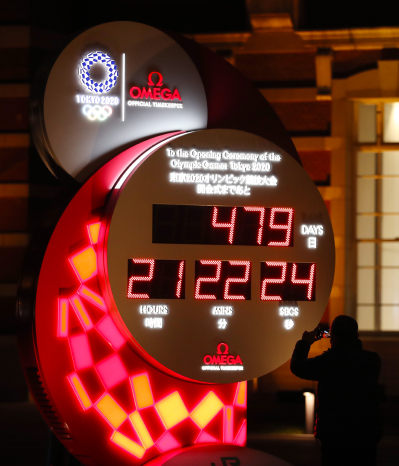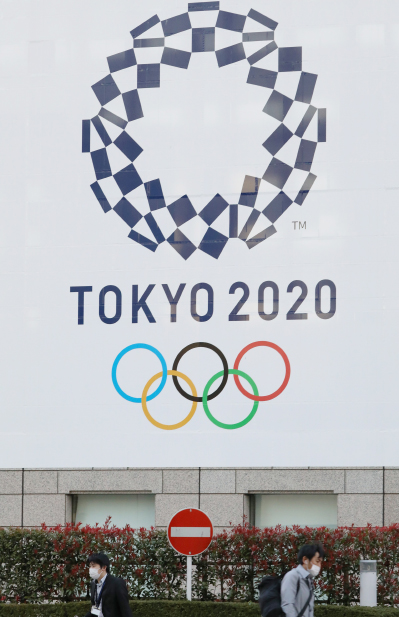| Lifestyle |
| Restart of a New World | |
| The Tokyo 2020 Olympic Summer Games are rescheduled due to the coronavirus pandemic | |
|
|
 Retired Japanese swimmer Naoko Imoto holds the torch containing the Tokyo Olympic flame at the Panathenaic Stadium in Athens, Greece, on March 19 (XINHUA)
2020 was expected to deliver a glorious Summer Olympics. "Advertisements everywhere and changing numbers on countdown boards in Tokyo reminded people the event was coming," Li Yifan, a Chinese working in Tokyo, told Beijing Review. But the escalating novel coronavirus (COVID-19) pandemic has forced the delay of the Tokyo 2020 Olympic Summer Games. The event was originally scheduled to run from July 24 through August 9 this year. For Li, the chance is lost for him to witness the sporting spectacle—he will be moving back to China after living in Japan for over four years. "It was sad to see the countdown outside my workplace stop following the postponement," he said, adding that his Japanese friends and colleagues are more concerned about the growing pandemic than the Olympics. On March 30, the organizers including the International Olympic Committee (IOC) announced the new dates. The first summer games ever to be postponed will run from July 23 to August 8, 2021, but will still be called the 2020 Olympics. Accordingly, the Paralympics was put back to August 24 through September 5 next year. History relived The Olympic torch relay was to cover 859 municipalities across all of Japan's 47 prefectures. It arrived in Japan on March 20. Shinzo Abe, Japan's Prime Minister, said on March 28 that the torch would remain lit in the country. Abe said the torch will guide humanity through the current darkness and he wants to make the games a symbol of mankind's victory. In 1964, Japan hosted the summer games for the first time. It was a valuable opportunity to improve its international status and revitalize its economy, Hu Lingyuan, a professor at the Institute of International Studies, Fudan University, told Nanfang Daily. The construction of infrastructure, such as highways and the Tokyo International Airport, has played a vital role in the country's development. The games even had an effect on Japanese culture, Hu said. The country had shown enormous enthusiasm for the Olympics. Since 2017, people in Japan have donated more than 5 million mobile phones and nearly 5 tons of old electronic equipment to extract precious metals for the medals. Today, Japan faces many problems, such as an aging population and economic recession. The Abe administration hopes to take this opportunity to lift the country's fortunes again. "Besides stimulating Japan's economy, Abe wanted it to be the crowning achievement of his tenure," Shi Yongming, a researcher in international studies, said. Although an increasing number of COVID-19 cases has been reported since February, Abe had reiterated his intent to hold the games as planned. But according to a poll by Kyodo News, nearly 70 percent of those asked did not think that the Tokyo 2020 Olympics would go ahead as planned. "Abe believed that Japan can control and curtail the pandemic before July," said Shi. "But the deteriorating situation and pressure from the international community ultimately forced the administration to change its mind." Canada and Australia had already stated that they would not send teams to the Tokyo games if they were held in 2020. The U.S. Government also implemented strict travel restrictions. "The Abe administration does not want an event without the participation of Japan's Western allies, which would make it unsuccessful," Shi said. On March 30, Yoshiro Mori, President of the Tokyo 2020 Organizing Committee, announced that the games would be postponed until the summer of 2021. According to Mori, this would enable better organization of transport, recruitment of volunteers and provision of tickets for those in Japan and overseas, as well as allowing for the COVID-19 crisis to subside.  A countdown board reads 479 days to go in Tokyo on March 30, after the new dates for the Tokyo 2020 Olympics were announced (XINHUA)
Cushioning the blow The revised dates allow more time for the health authorities and all involved in the organization of the games to deal with the changing pandemic landscape. The country has now shifted its priority to containing the virus, and the spike in confirmed infections after the government announced the postponement has sparked controversy. Former Prime Minister Yukio Hatoyama tweeted that Tokyo had avoided implementing stringent measures and downplayed the number of COVID-19 patients to create the impression that the city was in control of the coronavirus outbreak. It seems, however that the virus was spreading during this time. Tokyo has since strengthened control on travel, transportation, dining out and public activities. Li's company has adopted remote working, and he will avoid going out except to buy necessities until at least mid-April. Hu from Fudan University said the postponement has sweeping consequences in Japan, with 63 domestic companies having contributed over $3.1 billion. The uncertainty will affect their confidence and leave them wary of further investment. The altered schedule will also have a detrimental influence on the service industry, worsening the recession in an already fragile economy. The Japanese Government plans to unveil a new stimulus package, exceeding the amount spent to counter the 2008 financial crisis. Some people worry that the delay will result in changes in the international sports calendar in 2021, particularly for China and the 2022 Beijing Winter Olympics. The organizers of the Beijing 2022 Winter Games told Xinhua News Agency that they will evaluate the impact of the new schedule in light of the unusual situation of the summer and winter games being held within half a year of each other. They will keep in contact with the IOC and Olympic family and push forward preparations. Shi does not think the rescheduling of the Tokyo 2020 Summer Olympics will affect the winter games in 2022, and suggests enhancing the connection between the two events to showcase the solidarity of Asian countries.  People wearing masks pass the emblem of the Tokyo 2020 Olympic Summer Games in Tokyo on March 25 (XINHUA)
Human resilience Katarina Johnson-Thompson, a heptathlon specialist who won the gold at the 2019 World Championships organized by the International Association of Athletics Federations, was stoical about the news of the deferral. In a tweet on March 24, the 27-year-old two-time Olympian said, "Waited eight years for this, what's another one in the grand scheme of things? It's for all the right reasons and the safety of everyone! Hope everyone keeps safe and stay indoors." The change will disrupt the training of athletes and increase the pressure on them. They must now work out how to maintain their physical and psychological state. Andrew Parsons, President of the International Paralympic Committee, said on March 30 that deciding the new dates in such a timely manner has provided more certainty for the athletes . He hopes that when the Paralympic Games take place in Tokyo next year, they will be an extra-special display of humanity uniting as one, a global celebration of human resilience, and a sensational showcase of sport. Marco Balich, Executive Producer of the opening ceremony for the Tokyo 2020 Olympics, told Reuters that next year's opening ceremony will incorporate elements of people fighting the pandemic in the performances. Quarantined at home in Milan, Balich thinks his team can use this opportunity to rethink and produce an even better illustration of Olympic values. "Staging the Olympics will be the pinnacle, the restart for this new, strong world," he said. Copyedited by Laurence Coulton Comments to liqing@bjreview.com |
|
||||||||||||||||||||||||||||||
|